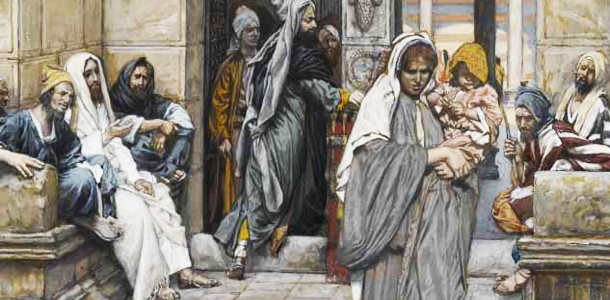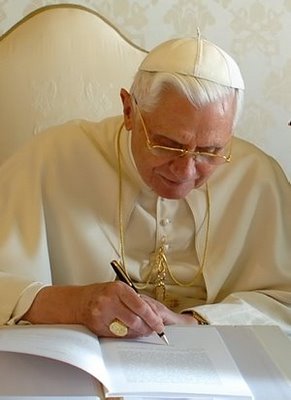Two Mighty and Courageous Widows
November 6, 2012 By Fr. Thomas Rosica Leave a Comment

Thirty-second sunday in ordinary time – November 11, 2012
The readings for this Sunday are: 1 Kings 17:10-16; Hebrews 9:24-28; Mark 12:38-44 or 12:41-44
Today’s Old Testament reading from 1 Kings 17:10-16 and the Gospel story from Mark 12:38-44 present us with two remarkable widows who challenge us by their conviction, generosity and faith. They force us to reexamine our understanding of the poor and poverty, and look at our own ways of being generous with others. I would like to offer some reflections on the stories of these two biblical figures and then apply their example to our own lives, through the lenses of Pope Benedict XVI’s encyclical letter Caritas in Veritate.
Elijah’s faith
Whenever I read stories from the Elijah and Elisha cycle in the first and second books of Kings, I always say a prayer of thanksgiving for one of my professors from the Pontifical Biblical Institute in Rome, Jesuit Father Stephen Pisano, who taught the best course I had in the Old Testament: “The Man of God in the Books of Kings.” God knows how many times I have gone back to those notes and appreciated anew the stories of Elijah and his disciple Elisha, and their efforts to make God’s Word known and loved in the land of Israel! In I Kings 17:8-16, God continues to test the Prophet Elijah. While today’s lectionary reading begins with Verse 10, it is important to go back to Verse 8 to understand the full meaning of the text. In Verse 8 we read: “Then the word of the Lord came to him, saying… .”
Elijah did not set out until he received the message from God. It is essential for us to be in communication with God through listening to God’s Word before setting out on mission.
Elijah is then told to go to Zarephath (v 9), which is part of Sidon. Verse 9 contains three commands: “arise,” “go,” and “stay.” The prophet will be tested with each of these commands through faith, trust, obedience, availability and commitment. When Elijah is told to “arise,” it is not only a physical movement but a spiritual one. For Elijah, following the Lord obediently is the result of his own spiritual reawakening.
The second command – “go to Zarephath” – carries with it the idea of a journey, including risks, hardships and dangers. Elijah is sent to a specific place, Zarephath, which means “a smelting place, a place of testing.” Furthermore, Zarephath was in the land of Sidon, which belonged to the wicked Jezebel. Elijah is hardly being sent to a vacation destination for rest and relaxation!
The third command – “stay there” – was a great challenge to his commitment, trust and vision as a man of God who was simply seeking to serve the Lord. Elijah’s provision would come from a poor, destitute, depressed widow facing starvation in the pagan nation of the Sidonians who represented the forces clearly in opposition to the God of Israel.

Elijah encounters his benefactress, not living in a large house and sharing her excess with itinerant prophets, but rather at the gate of the city, collecting a few sticks since she had no fuel at home to cook even a meagre meal.
The God who commanded the ravens and who provided for Elijah in the desert (I Kings 17:1-7), was the same God who had commanded the widow and would provide for the prophet through her. At Zarephath, the poor woman listened to Elijah’s instruction and it was just as he had promised according to the Word of the Lord. She saw the power of God: The widow, her son, and Elijah were all sustained.
What lessons can we learn from this passage?
Because of a poor woman’s generosity and goodness, and Elijah’s faithfulness, God strengthened the prophet’s faith, renewed his capacity for ministry, using him to comfort the widow and her son at the same time. The Lord God will provide for us, beyond outward appearances of weakness, failure and fear. God always does far more than we can ever ask for or imagine.
Just a mite
In today’s well-known Gospel story (Mark 12:38-44), Jesus praises the poor widow’s offering, and makes it clear that the standard measurement for assessing gifts is not how much we give to the works of God or how much we put in the collection basket, but how much we have left for ourselves. Those who give out of their abundance still have abundance left.
Is Jesus exalting this woman because she emptied her bank account for the temple? Is Jesus romanticizing and idealizing the poor? I have yet to meet people who dream of growing up destitute, poor, hungry and homeless. I don’t know anyone who delights in living from one government social assistance check to the next, nor people who enjoy rummaging through garbage bins and are proud that they cannot afford to pay for electric and water bills for their inadequate and even dangerous housing situations during cold Canadian winters.
The woman in today’s provocative Gospel story was poor because she was a widow. She was completely dependent on her male relatives for her livelihood. To be widowed meant not only losing a spouse, but more tragically, losing the one on whom you were totally dependent. Widows were forced to live off of the generosity of other male relatives and anyone in the community who might provide for one’s needs.
The two coins in the woman’s hand were most likely all she had. When one has so little, a penny or two isn’t going to move that person from complete social assistance to employment. With the coins or without them, the widow was still a dependent person. She had no status in life. She was totally dependent on the grace of God, yet she was indeed rich in God’s mercy.
Jesus never condemns the rich but simply says that they will find it difficult to enter the kingdom. What matters is not how much money is stored in bank accounts or kept in stocks and bonds, but rather for what that money is destined.
Will the money be used to assist others, to make the world a better place? Will be it used to feed the hungry, clothe the naked, provide for the homeless and destitute poor? Will it be used to build a culture of life? Do our lives revolve around the money or are we dependant on God who truly makes us rich? Do we behave as owners or live as stewards?
The widow tossed her only signs of independence into the collection basket, but she maintained her complete dependence on God and neighbour. Her example of faith is grounded in the love of God: her love for God and God’s love for her. She was a steward and not an owner of her meagre possessions. This poor widow teaches us that dependence, far from being oppressive and depressive, can really lead to a life lived in deep joy and profound gratitude.
Charity in truth
 Four brief sections from Benedict XVI’s encyclical letter Caritas in Veritate merit our careful reflection and meditation this week.
Four brief sections from Benedict XVI’s encyclical letter Caritas in Veritate merit our careful reflection and meditation this week.1. The search for love and truth is purified and liberated by Jesus Christ from the impoverishment that our humanity brings to it, and he reveals to us in all its fullness the initiative of love and the plan for true life that God has prepared for us. In Christ, charity in truth becomes the Face of his Person, a vocation for us to love our brothers and sisters in the truth of his plan. Indeed, he himself is the Truth (cf. John 14:6).
23. The mere fact of emerging from economic backwardness, though positive in itself, does not resolve the complex issues of human advancement, neither for the countries that are spearheading such progress, nor for those that are already economically developed, nor even for those that are still poor, which can suffer not just through old forms of exploitation, but also from the negative consequences of a growth that is marked by irregularities and imbalances.
42. For a long time it was thought that poor peoples should remain at a fixed stage of development, and should be content to receive assistance from the philanthropy of developed peoples. Paul VI strongly opposed this mentality in Populorum Progressio.
Today the material resources available for rescuing these peoples from poverty are potentially greater than before, but they have ended up largely in the hands of people from developed countries, who have benefited more from the liberalization that has occurred in the mobility of capital and labor. The world-wide diffusion of forms of prosperity should not therefore be held up by projects that are self-centred, protectionist or at the service of private interests.Fr. Thomas Rosica, CSB
75. While the poor of the world continue knocking on the doors of the rich, the world of affluence runs the risk of no longer hearing those knocks, on account of a conscience that can no longer distinguish what is human. God reveals man to himself; reason and faith work hand in hand to demonstrate to us what is good, provided we want to see it; the natural law, in which creative Reason shines forth, reveals our greatness, but also our wretchedness insofar as we fail to recognize the call to moral truth.
CEO, Salt and Light Catholic Media Foundation
